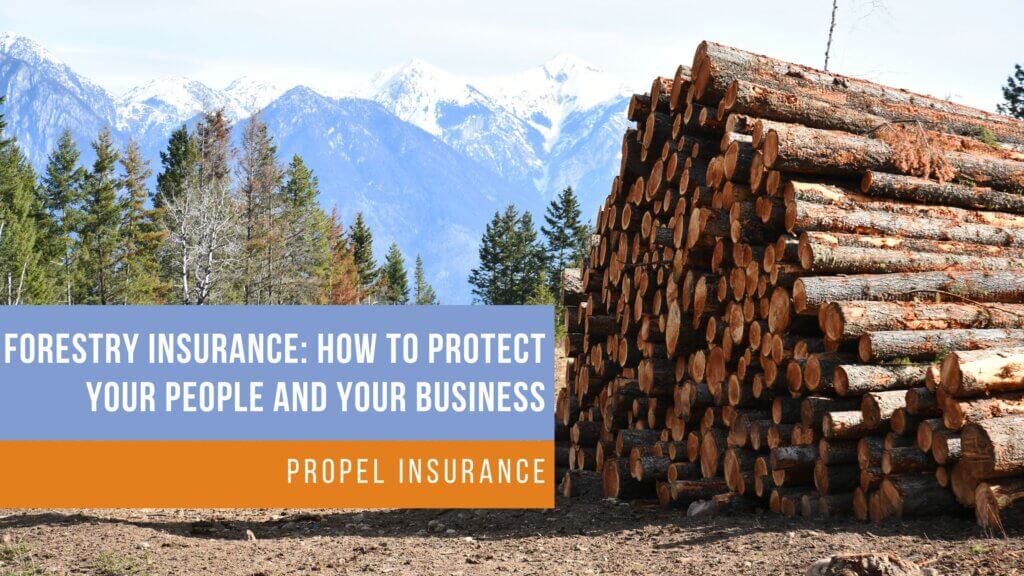Propel provides innovative insurance solutions to thousands of companies across the country. We make it our business to know your world inside and out.
Commercial, Insights, Logging
Forestry Insurance: How to Protect Your People and Your Business
The forest industry is an integral part of the U.S. economy. From the paper we write on to the homes we live in, products made from lumber play an important role in our everyday lives. The forestry industry also provides jobs for thousands of people. According to the U.S. Bureau of Labor Statistics (BLS), around 47,100 people are employed in the forest and logging industry in the U.S. This is a critical industry, so it’s also critical to secure the right protection in the form of forestry insurance.
The Risks Facing the Forestry Sector
The forestry industry is an important sector, but it’s not always an easy or safe one.
Injuries are common. BLS says that workers in logging jobs face strenuous work, long hours and hazardous conditions. They frequently work in remote locations where there are limited medical services, and they may have to work in harsh weather conditions. As a result, injuries are a major risk. In 2015, the nonfatal rate of injury illness with days away from work was 133.2 per 10,000 full-time equivalent workers for logging workers in the private industry. This is about 40% higher than the rate of 93.9 for all private industry workers.
Natural disasters, and wildfires in particular, are another major threat to the forestry sector. Wildfires have devasted many areas in recent years, especially in California and other western states. According to the National Interagency Fire Center, more than 7 million acres were burned in 2021. In 2020, more than 10 million acres were burned.
For logging crews and other forestry operations, these fires can result in major losses. According to Oregon Live, a logging crew suffered losses of around $1 million when the Lionshead fire blew through a job site and destroyed or damaged most of the equipment there. To make matters worse, not all of the equipment was fully insured.
The Oregon Forest Resources Institute says that Oregon’s forest-dependent businesses experienced losses of about $5.9 billion as a result of the Labor Day fires that occurred in 2020. That’s just one fire event in one state. Major losses are an unfortunate risk in this industry.
Protecting Your Company
Insufficient insurance can be a problem among loggers and other businesses in the forestry sector, and it can make recovery from losses even more challenging. For small business owners, one major loss could put the entire business in jeopardy if sufficient insurance is not in place.
It’s important to make sure that you have the right types of coverage, including the right terms and limits, to protect your business and your workers. Key policy types include the following:
- Workers’ Compensation
- Commercial Auto
- Property
- General Liability
- Umbrella
Challenges in Securing Coverage
Solid insurance coverage is critical in the forestry industry because of the exposures involved. These risks also make securing appropriate coverage more challenging.
For example, the fact that the logging industry sees so many injuries means that the workers’ compensation rates can be very high. Businesses with a history of claims may see even higher rates. Commercial auto rates can also be high.
General liability is another challenging market. If firefighting is involved, obtaining this coverage can be even more challenging. Businesses with a strong track record are at an advantage, but new businesses that lack any history may have difficulty securing coverage at all.
Get the Specialized Forestry Insurance Advocacy You Need
Securing the right insurance coverage can be challenging, especially if you’re involved with firefighting, but businesses in the forestry sector can obtain the policies they need with the help of our specialized team.
We specialize in providing business insurance solutions for businesses in the forestry and reforestation industries. It’s a difficult market, but we know the ins and outs and can guide business owners through the process.
Having a strong submission is essential. We can help you understand what underwriters are looking for, and we will help you prepare everything that needs to go into a strong presentation, from letters of recommendation from previous employers to details about the equipment and safety features.


